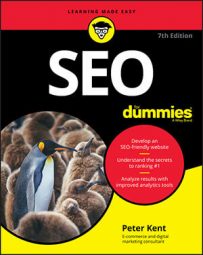 ©ilkercelik/Shutterstock.com
©ilkercelik/Shutterstock.comDecide Which Search Sites You Care About
In North America, you really care about only two search engines: Google and Bing. Yes, there’s Yahoo! too, but Yahoo! gets search results from Bing, so if you’re in the Bing index, you’re in Yahoo!, too. And most sites that provide a search function get their results from one of these two systems. Those two systems are responsible for about 99 percent of all searches people carry out at search engines, with the rest carried out at tiny sites such as Ask.com.
But there are other things to consider. A huge number of searches are also carried out at sites not considered to be search engines, such as YouTube, and the e-commerce, price comparison, and product search sites, such as Amazon.com, Walmart.com, Craigslist.com, eBay.com, and more. So, if you’re selling products, you really need to understand these sites.
Keywords: The Foundation of SEO
SEO is built on keywords: the words that people type into search engines when looking for the kinds of products and services you sell or information you provide. The same words that must appear in your website, in the right places, in order for your pages to be regarded as matches for those searches. They need to appear in the anchor text of links pointing to your site, too.
Use the wrong keywords, and you won’t be matched up with your prospects, the people you want to come from the search engines to your site.
Now, you may think you know the keywords that are important for you, for your business, or blog, or nonprofit, or whatever. You don’t. Some of the keywords you have in mind are probably not that important, while you’ve almost certainly missed some important words, too. That’s why it’s essential that you do a keyword analysis, to figure out what people are actually searching for. Don’t skip this phase, it’s essential!
Search Engines and Votes
Search engines and votes is a critical concept, and it revolutionized the search engine business back in the late 1990s. Search engines essentially do two things:
- They index your web pages, so they know, based on the words they find in the text in your site, what is in your site.
- They examine the links pointing from other sites to yours; they regard these as votes for your site.
So, search engines end up with two pieces of information about your site: They know what is in your site, and they know how much the Internet cares about your site, in how much esteem your site is held by the owners of other sites.
This means that sometimes, even if Site A has much better content than Site B, Site B might still rank higher than Site A if it has more votes (more or better links) than Site A.
This, then, was the search-engine revolution. The search engines figured out a way to get other people, the owners of websites, to tell the search engines which sites were more important than others. A lot has happened in search engine technology since the end of the last century, but arguably no development in the 21st century has been as influential as this revolutionary approach to evaluating websites.
The Two Sides of SEO
On-page optimization and off-page optimization are essentially two sides to SEO. On-page optimization means the things you do to your web pages to make them “search engine friendly.” Putting keywords into URLs, heading tags, and title tags, using structured data markup to tag information, making sure your site’s pages load into users’ browsers quickly, and so on all fall under on-page optimization.
Off-page optimization means getting links pointing to your site from other sites— that is, backlinks (because they point back to your site). You need a variety of different types of links, including links from popular sites and links with good keywords in the anchor text (the text that can be read and clicked upon).
Which is more important, on-page optimization or off-page optimization? Both are important, and both can be part of a good SEO strategy. Some SEO campaigns may be heavier on on-page than off-page optimization, while other campaigns may be heavier on off-page than on-page.
But here’s a really important concept to understand, one that you’ll probably hear contradicted! But here goes: Off-page optimization is more powerful than on-page optimization! Links are more powerful than content.
A really good link campaign can boost even sites with mediocre content. But it doesn’t matter if you have the greatest content. If your link profile sucks your site won’t rank well.
Why is this? Because links are votes. The major search engines regard links pointing to your website from a hundred other sites as a hundred votes from the Internet community for your site.
So, although you still need to understand on-page optimization, you must not ignore linking and may in fact need to spend more time on linking than content.
SEO Firms Often Mislead
There’s a very low barrier to entry to the SEO business. Anyone can set up shop as an SEO consultant. Furthermore, SEO is, to most businesspeople, a black box. They haven’t taken the time to understand how it works — they have businesses to run, after all! — and so it all sounds like magic to them. Thus, scams abound. It’s easy to scam people when they don’t really understand what they are buying.
This means that there’s a very good chance that if you use an SEO firm to do your SEO work, you may not be happy with the result. That doesn’t mean nobody should ever use an SEO firm, but it does mean you need to pick carefully.
Here’s one tip. Many SEO firms focus on content building. They sign you up for a monthly program and build lots of content on your website every month, arguing that “Content is King,” and “Google loves great content,” and that it’s going to take time for the search engines to index and appreciate your great new content. They might create a few links now and then, but the focus is on content.
Be very careful of firms focusing predominantly on content building, with much less focus on links. Many of the more successful firms focus more on link building. Perhaps they build content, but it’s often content on other websites designed to hold links pointing back to yours. They might still do some content work on your site and optimize the content you already have, but there’s a strong focus on building links because links trump content.
Still, it’s very hard for businesses to pick good SEO firms. The overall standards are low. You may find link-focused firms that do a bad job, and content-focused firms (that still realize links are important) that do a good job. So, check references!
Dominate the Search Results
The search results are a complex mix of different types of content. If you focus purely on traditional SEO — creating keyworded pages in your site and then building links from other sites back to yours — you may do very well in the regular, web page organic search results, but still miss other great opportunities. Here’s a quick rundown of different types of listings you might want to consider:
- Sitelinks below organic results: You’ve seen some search results that contain two columns of links below the usual search result. These are known as sitelinks, and there are things you can do to encourage search engines to create these for your search results, allowing you to take up more space on the page.
- Search boxes below organic results: You’ve probably also seen the search boxes that appear under some search results. Again, you take up more space on the page and appear more prominent.
- Special organic formatting: Some search results have special forms of formatting. You might see gold stars and review information or specially formatted recipe instructions. These are created using structured data markup.
- Knowledge Panels (from the Knowledge Graph): These special boxes appear prominently near the top of the page and contain information about people, places, events, companies, and so on. In Google, they come from the Knowledge Graph database.
- Featured snippets: These little boxes are at the top of the search results and have a little information related to the search, such as a quote or a set of instructions of some kind answering a question the searcher entered.
- Local results: Hugely important! These results are information related to local results. Search for pizza or shoe store, and you’ll see information, and most likely a map, related to local pizza and shoe stores.
- Image and video results: Search results often include links to images and videos, where appropriate.
- PPC advertising results: At the top, and often at the bottom, you’ll see Pay Per Click (PPC) advertising results. You have to pay to play, but many businesses find it worthwhile.
- Shopping results: Another form of PPC ads, these product results include a picture of the product being sold.
- News results: Information about current happenings, whether from large, well-known news sources, or smaller specialty sources.
- Twitter results: Tweets, when relevant, often appear at the top of the results.
Consider some of these forms of results and, if you have the time and energy, learn how to get your content included.

